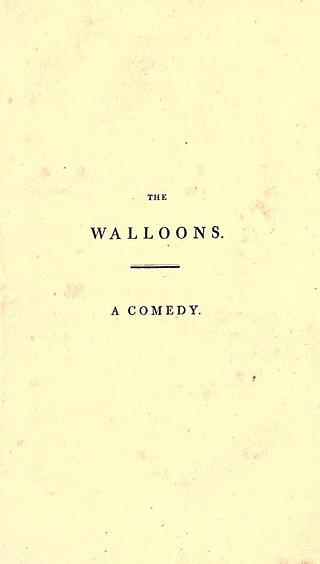
The Walloons is a comedy play by the British writer Richard Cumberland. It was first staged at the Theatre Royal, Covent Garden in London in April 1782. The original cast included John Henderson as Father Sullivan, Richard Wroughton as Montgomery, John Quick as Sir Solomon Dangle, Charles Lee Lewes as Davy Dangle, Francis Aickin as Daggerly, Matthew Clarke as Don Vincentio Drclincourt, John Edwin as Pat Carey, James Fearon as Bumboat, James Thompson as Tipple, Sarah Maria Wilson as Kitty Carrington, Ann Pitt as Mrs Partlet, Mrs Webb as Lady Dangle and Elizabeth Satchell as Agnes. The character of Father O'Sullivan was widely believed to be based on Father Thomas Hussey an Irish-born Priest with whom Cumberland conducted secret talks in an attempt to secure a peace agreement between Britain and Spain during the American War of Independence.

Robert Keeley was an English actor-manager, comedian and female impersonator of the nineteenth century. In 1823 he originated the role of 'Fritz' in Presumption; or, the Fate of Frankenstein, the first known stage adaptation of Mary Shelley's novel Frankenstein.

James Robertson Anderson was a Scottish stage actor and dramatist.
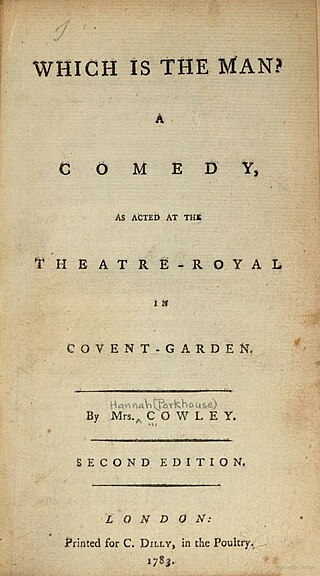
Which is the Man? is a 1782 comedy play by the British writer Hannah Cowley. The original Covent Garden cast included John Henderson as Fitzherbert, William Thomas Lewis as Beauchamp, Richard Wroughton as Belville, John Quick as Pendragon, Charles Lee Lewes as Lord Sparkle, Isabella Mattocks as Sophy Pendragon, Sarah Maria Wilson as Kitty, Mary Morton as Clarinda, Harriet Pitt as Tiffany, Elizabeth Satchell as Julia and Elizabeth Younge as Bloomer.
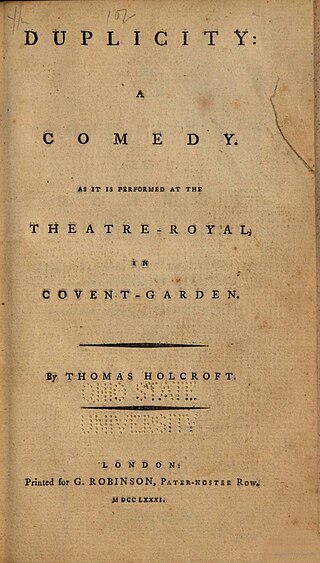
Duplicity is a 1781 comedy play by the British writer Thomas Holcroft.

A Cure for the Heart Ache is a 1797 comedy play by the British writer Thomas Morton.
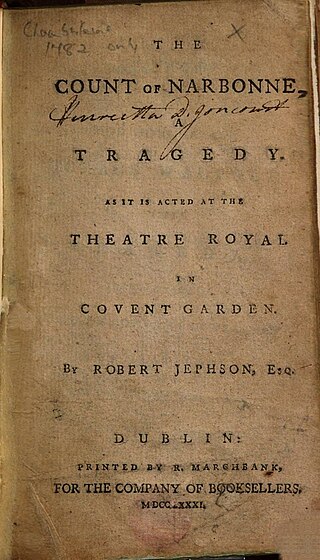
The Count of Narbonne is a 1781 tragedy by the Irish writer Robert Jephson. It was inspired by Horace Walpole's novel The Castle of Otranto.

Old Maids is an 1841 comedy play by the Irish writer James Sheridan Knowles. It was first staged at the Theatre Royal, Covent Garden in London on 12 October 1841. The cast included John Harley as John Blount, George Vandenhoff as Thomas Blount, Walter Lacy as Robert, Robert William Honner as Harris, William Payne as Stephen, Alfred Wigan as Jacob, Lucia Elizabeth Vestris as Lady Blance and Louisa Nisbett as Lady Anne. It was produced towards the end of the theatrical career of Sheridan Knowles, before he turned to novel-writing.

Rugantino is an 1805 melodrama by the British writer Matthew Lewis. An afterpiece, it was originally staged at the Theatre Royal, Covent Garden on 18 October 1805. It was inspired by the 1801 French play L'Homme à Trois Visages by René-Charles Guilbert de Pixérécourt. The original cast included Charles Murray as Andreas, Duke of Venice, John Liston as Meme, William Abbot as Poole, Henry Erskine Johnston as Rugantino and Isabella Mattocks as Camilla. It premiered in Ireland at Dublin's Crow Street Theatre on 26 January 1807. It was revived at Drury Lane in 1820 with a cast featuring James William Wallack as Rugantino, Thomas Cooke as Contarino, William Oxberry as Memme, John Pritt Harley as Stephane, Walter Maddocks as Harald, Sarah Sparks as Camilla and Charlotte Tidswell as Bettina.

The Conquest of Taranto is an 1817 musical drama written by William Dimond with music composed by Michael Kelly. It appeared at the Theatre Royal, Covent Garden on 15 April 1817. The original cast featured Junius Brutus Booth as Rinaldo, William Macready as Valencia, Charles Mayne Young as Aben Hamet, Daniel Egerton as Gonzales, Sarah Booth as Oriana and Kitty Stephens as Rosalind. Macready was reportedly dissatisfied with his role, coveting that of Rinaldo, and unsuccessfully offered thirty pounds the Covent Garden manager Thomas Harris to release him during rehearsals. The first Dublin performance was at the Crow Street Theatre on 5 August 1817. It also appeared at the Federal Street Theatre in Boston and other American venues.

Foscari is an 1826 historical tragedy by the British writer Mary Russell Mitford. The plot revolves around Francesco Foscari, the son of the Doge of Venice, who is wrongly accused of murder and has to go into exile. It premiered at the Theatre Royal, Covent Garden on 4 November 1826. The original cast included Charles Mayne Young as Foscari, Doge of Venice, Charles Kemble as Francesco Foscari, James Prescott Warde as Count Erizzo, and Daniel Egerton as Donato.

Charles the First is a historical tragedy by the British writer Mary Russell Mitford. It depicts the imprisonment and trial of Charles I before his execution in 1649 following his defeat in the English Civil Wars. It was first written in 1825 and originally intended to be performed at Covent Garden. Mitford wrote the play with the encouragement of William Macready and Charles Kemble, the two leading performers at Covent Garden. However, the politically controversial top of regicide led to it being refused a licence by the Lord Chamberlain, the Duke of Montrose.

Damon and Pythias is an 1821 tragedy by the Irish writers John Banim and Richard Lalor Sheil. It is based on the Greek legend of Damon and Pythias. It premiered at the Theatre Royal, Covent Garden in London on 28 May 1821. The original cast included William Macready as Damon, Charles Kemble as Pythias, William Abbot as Dionysius, Daniel Egerton as Damocles, William Chapman as Nicias, Thomas Comer as Procles, Charles Connor as Lucullus and Maria Foote as Hermion. It was widely performed in Ireland and the United States including at the Chestnut Street Theatre in Philadelphia.
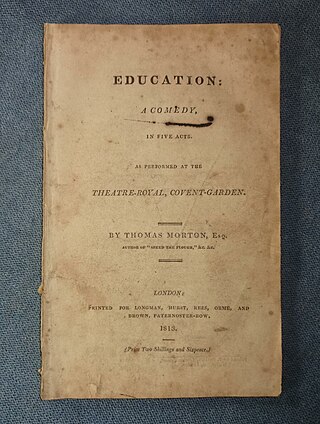
Education is an 1813 comedy play by the British writer Thomas Morton. It premiered at the Theatre Royal, Covent Garden in London on 27 April 1813. The original cast included Charles Mayne Young as Count Villars, Charles Mathews as Sir Guy Stanch, John Fawcett as Mr. Templeton, Charles Kemble as Vincent Templeton, John Liston as Suckling, William Barrymore as Damper, John Emery as Broadcast, Mary Catherine Bolton as Rosine, Maria Theresa Kemble as Mrs Templeton, Sarah Booth as Ellen and Mary Ann Davenport as Dame Broadcast.

The Gazette Extraordinary is a comedy play by the British writer Joseph George Holman, published and first performed in 1811. It premiered at the Theatre Royal, Covent Garden in London on 23 April 1811 The original cast included Charles Mayne Young as Lord De Mallory, Joseph Shepherd Munden as Heartworth, William Barrymore as William Clayton, John Fawcett as Doctor Suitall, Charles Murray as Randall, Nannette Johnston as Lady Julia Sandford, Mary Catherine Bolton as Miss Alford, Mary Ann Davenport as Mrs Leech and Sarah Booth as Ellen Meredith. It was acted eleven times during its initial run.

Fashionable Levities is a 1785 comedy play by the Irish writer Leonard MacNally. It premiered at the Theatre Royal, Covent Garden in London on 7 April 1785. The original cast included William Thomas Lewis as Welford, John Quick as Sir Buzzard Savage, Richard Wroughton as Captain Douglas, Ralph Wewitzer as Colonel Staff, John Edwin as Nicholas, John Henderson as Mr Ordeal, Margaret Martyr as Clara, Sarah Maria Wilson as Grace and Mrs Webb as Honour. MacNally dedicated the play to the Anglo-Irish aristocrat the Countess of Salisbury. The Dublin premiere took place at the Crow Street Theatre on 5 April 1786.

Know Your Own Mind is a 1777 comedy play by the Irish writer Arthur Murphy. It premiered at the Theatre Royal, Covent Garden on 22 February 1777. The original Covent Garden cast included William Thomas Lewis as Millamour, Charles Lee Lewes as Dashwould, Richard Wroughton as Malvil, Francis Aickin as Bygrove, Cockran Joseph Booth as Captain Bygrave, James Fearon as Sir John Millamour, John Whitfield as Sir Harry Lovewith, Ralph Wewitzer as Charles, Servant of Millamour, Isabella Mattocks as Lady Bell, Mary Dayes as Lady Jane and Elizabeth Hartley as Miss Neville. The Irish premiere was at the Crow Street Theatre in Dublin on 13 August 1778. It was acted nineteen times at Covent Garden and in 1789 was revived at Drury Lane, with Dorothea Jordan in the cast, and remained a standard work well into the nineteenth century.

Folly as it Flies is an 1801 comedy play by the British writer Frederick Reynolds. It premiered at the Theatre Royal, Covent Garden on 29 October 1801. The original Covent Garden cast included Charles Murray as Sir Herbert Melmoth, Henry Erskine Johnston as Leonard Melmoth, William Thomas Lewis as Tom Tick, Joseph Shepherd Munden as Peter Post Obit, Thomas Knight as Shenkin, Samuel Simmons as Doctor Infallible, John Waddy as Cursitor, John Whitfield as Malcour, Maria Gibbs as Georgiana and Harriet Murray as Lady Melmoth. The Irish premiere took place at the Crow Street Theatre on 14 January 1802.

Begone Dull Care is an 1808 comedy play by the English writer Frederick Reynolds. It premiered at the Theatre Royal, Covent Garden in London on 9 February 1808. The original Covent Garden cast included Alexander Pope as Sir Arthur St Albyn, Charles Kemble as Algernon St Albyn, William Thomas Lewis as Modern, John Brunton as Danvers, John Fawcett as Lord Blushdale, John Emery as Solace, William Chapman as Trusty, Samuel Simmons as Geoffrey, Sarah Smith as Selina, Mary Ann Davenport as Deborah. The Irish premiere took place at the Crow Street Theatre in Dublin on 30 March 1808.

The Hebrew is an 1820 historical play by the British author George Soane. It premiered at the Theatre Royal, Drury Lane in London on 2 March 1820. It is inspired by the 1819 novel Ivanhoe by Walter Scott, with a number of the characters and plot elements removed. The original cast included Edmund Kean as Isaac, Alexander Pope as Prince Aymer, Thomas S. Hamblin as Brian de Bois Guilbert, Charles Holland as Cedric, William Penley as Ivanhoe, William Oxberry as Friar Tuck, Margaret Carew as Miriam and Sarah West as Rebecca. He dedicated the published version of the play to his father the architect Sir John Soane. The rival Theatre Royal, Covent Garden put on its own version of the novel, Ivanhoe by Samuel Beazley, the same year.





















